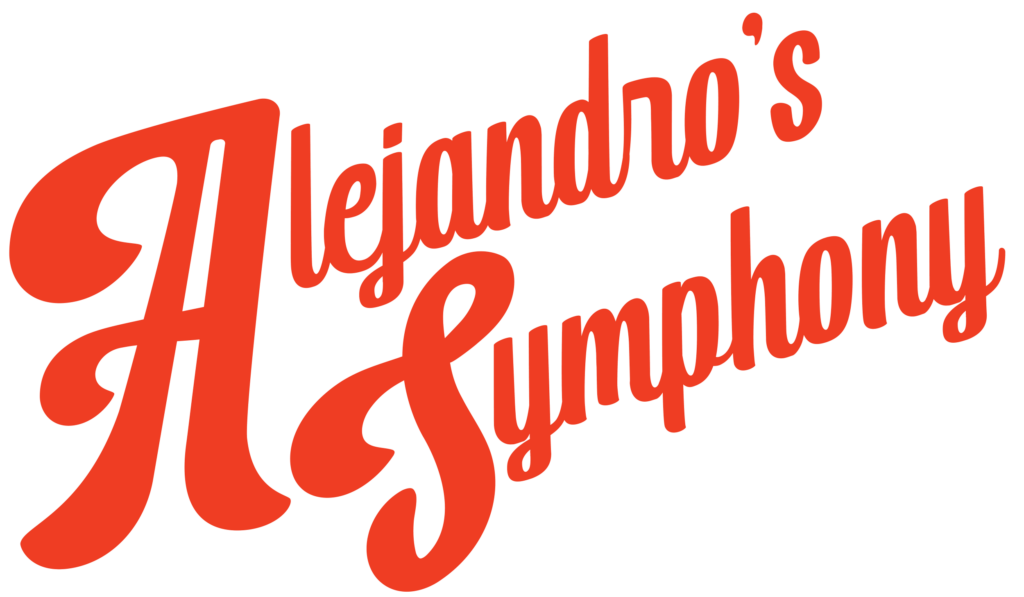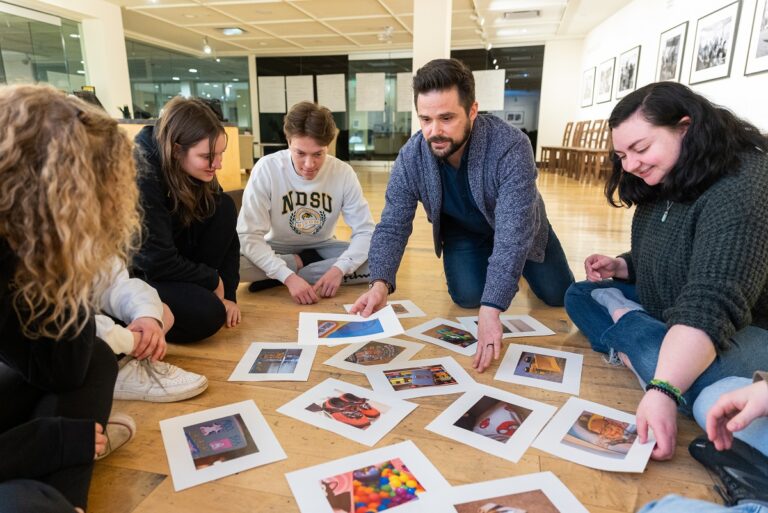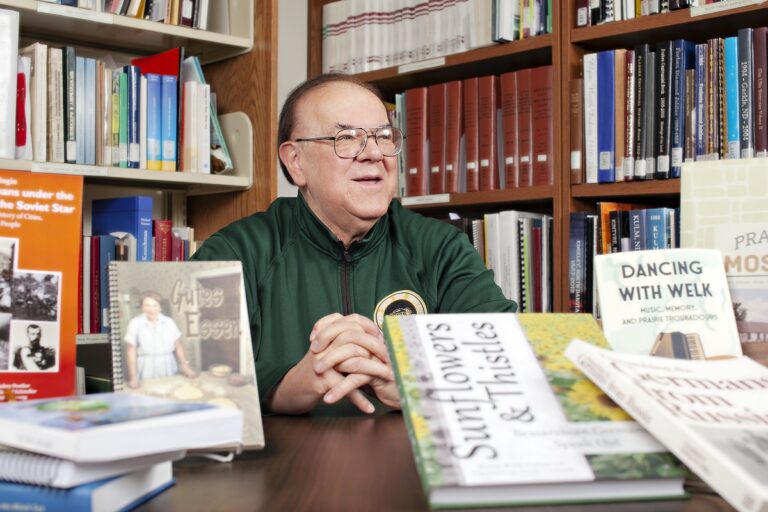NDSU assistant professor Marc Devine is collaborating with student-actors to bring stories from local foster parents to audiences in "Home."
Read More
On a music stand outside of NDSU’s Beckwith Recital Hall, pairs of bright orange earplugs incite adrenaline. To the incoming audience, they are simultaneously a gift and a warning — the possibility of noise and discomfort, offered almost like fortune cookies.
Inside the dimly lit recital hall in the Challey School of Music, glimpses of instruments appear out of shadows. The metallic pipes of a marimba glisten where the stage lights catch reflection. Large timpani basins appear like ships submerged in the sea at a dark and steady hour. People find their seats.
The lights lift, and percussion performance major Alejandro López ’25 steps onstage. Applause. Dressed in all black, he stops to smile and bow, then finds his place behind the marimba, two mallets in each hand. He situates the mallets in his grip, mimicking the motion of playing without touching the instrument, without making a sound. He shrugs his shoulders to loosen the body, as if he’s about to begin a race. Then, music.
“When you’re up there [onstage], everything, all your emotions, everyone can see through you,” Alejandro said. “You have no secrets. It’s like you and the audience, and you’re telling them your story.”
Born and raised in the mountain-cradled city of Tegucigalpa, Honduras, Alejandro studied at a highly competitive music conservatory in a class that began with 100 students but, by his senior year, had dwindled down to 16. Determined to follow in the footsteps of his older sister, Lauren, a professional flautist living in Tennessee, he began applying to American universities.
He needed to learn English, so he paid for three months of language lessons using money he made performing with the famed Spanish opera singer and conductor Plácido Domingo but failed his first English proficiency test. The hours-long exam cost hundreds of dollars and included writing, reading, listening, and speaking sections. Thankfully, on a second attempt, he passed.
Through his solo percussion recital, Alejandro tells the story of his journey to NDSU, offering themes and variations on self-discovery. The first piece, “Two Mexican Dances — II Movement” by Gordon Stout, is reminiscent of home, he says. It’s as if he’s in a park listening to a few guys playing folk music on a shared marimba. It’s friendly to the ear.
He contrasts melodic marimba with the raucous drumbeat of timpani in his next set. “In Jazz” and “In Funky” by Claudio Santangelo feature jazz music and hand drumming on timpani, an instrument more typically composed for orchestra, taking both musician and audience beyond the realm of expectations.
Alejandro’s family watches his recital from Honduras on a livestream, and Lauren watches from Tennessee. Before the final piece, a duo for multi-percussion he performs with his friend and fellow percussion student Jon Karels ’25, Alejandro speaks directly to the camera, addressing his family in Spanish. He says he wishes they could be sitting in the front row.
Where his family cannot physically be present, NDSU students, faculty, staff, and community members fill in the seats. Across networks and hometowns and countries of origin, people listen.
In this space, there is a shared language.

As a kid, Alejandro dreamt of being a bus driver. Then, around the age of 7, he noticed that the person playing the drum set at church was using foot pedals that looked a lot like a gas pedal and brake.
“I go on stage [after church] and I see drums, and they’re like two pedals, right? The one they use for the bass and the one they use for hi-hat. But I wasn’t thinking of that,” Alejandro says, cracking up as he remembers. “I was thinking, ‘Oh, this looks like a bus,’ you know? ‘This is it. I want to play that instrument.’”
He worked three jobs to save money to come to the U.S. Months after he arrived, with plans to study at a university in Florida, the COVID-19 pandemic shut the world down and created new obstacles to higher education. The university in Florida rescinded its scholarship offer.
Without friends or even instruments to play, Alejandro spent a year and three months in quarantine with his grandmother in Washington, D.C. He dreamt of his family and friends, of Tegucigalpa, of riding the bus listening to symphonies and boleros and Frankie Ruiz in his headphones, of touching a drum set again.
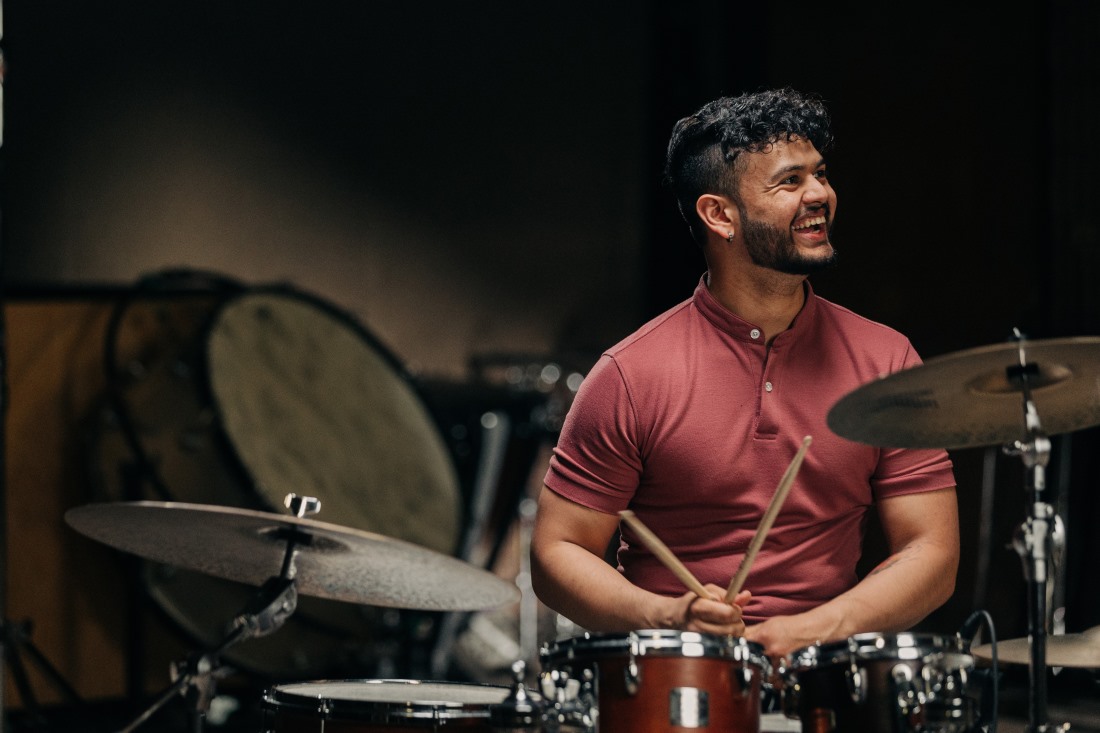
As pandemic restrictions lifted, Alejandro began sending out audition tapes, including one to NDSU. Sigurd Johnson, associate professor and director of orchestral activities and percussion studies, remembers hearing Alejandro play for the first time.
“He was already playing things that we might hear from a graduate-level student,” Sigurd said. “It was pretty clear that we wanted him to come to school here, and the cool thing about Alejandro being an undergraduate [was] … knowing that he was going to have an impact on our program for four years and also that hopefully we were going to have an impact on his development for four years as well.”
When Alejandro heard he had received the Euren Fellowship, a full-tuition scholarship for music majors established by Bob ’67, ’09 and Sheila ’23 Challey, he cried.
“I called my sister right away, I called my dad, and I just told them I got the scholarship,” Alejandro said. “That was a moment where I could finally see the light again.”
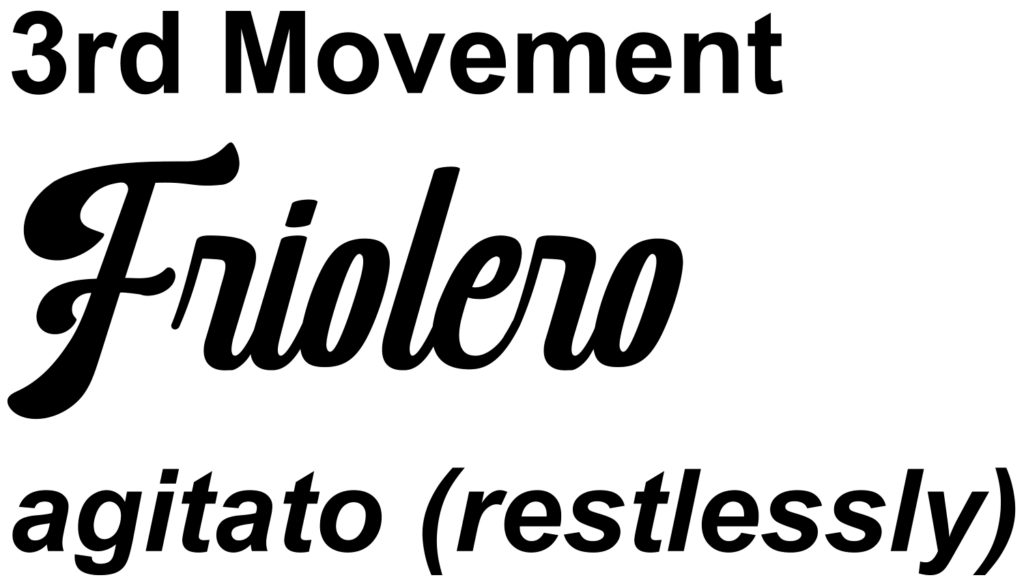
When he performs, Alejandro is an undeniable talent. Everything, from his posture to his breath work to the dynamics and phrasing he draws from each instrument, is commanding and intensely musical. But offstage, he has struggled with finding his identity in a second language.
“In Spanish, I’m a very extroverted person. I like talking to people, I like making friends,” Alejandro said. “When I came here, I was completely different. I was shy, I wouldn’t talk to anyone. It was like being a different person. It felt so bad — it’s like struggling and fighting against yourself.”
He could have had a steady job and good life back in Honduras but felt called to go beyond his comfort zone. Then, he experienced his first winter. Without a car, Alejandro spent nearly an hour walking to and from campus every day of his freshman year. He often found himself rehearsing until midnight, or sometimes even 2 a.m., then walking back to his apartment during a cold snap he says never seemed to end.
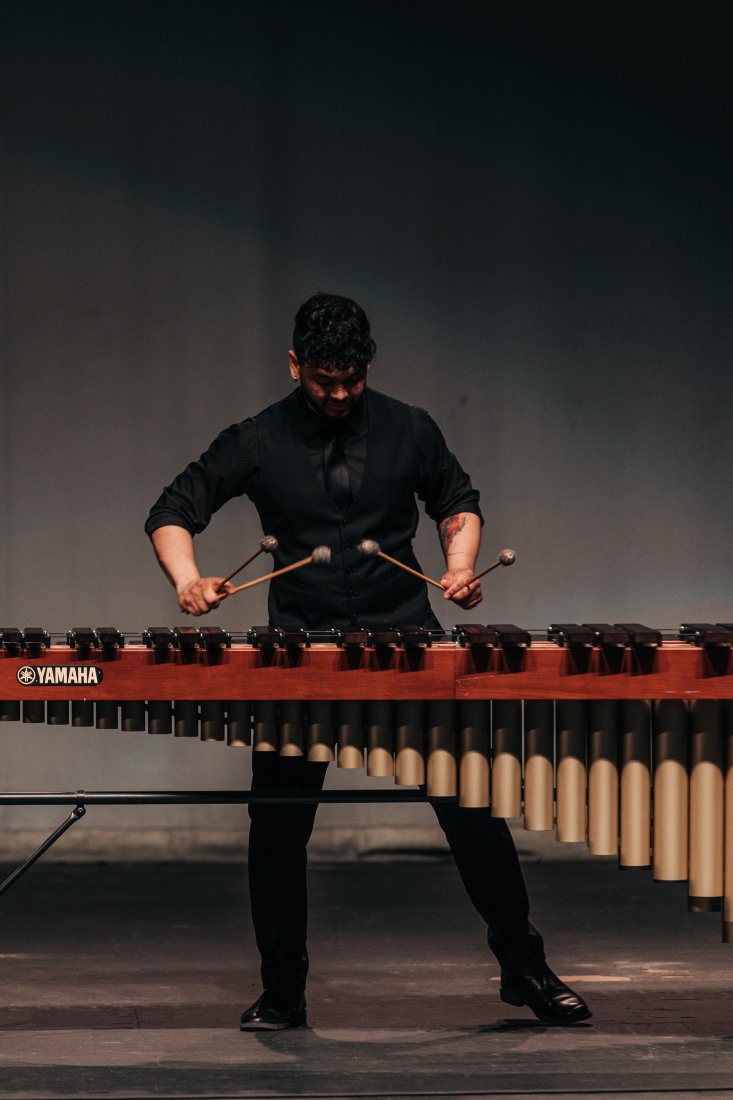
“I had to leave my family behind, leave my friends, leave my girlfriend, leave everything I knew: my culture, food, behavior, everything,” Alejandro said. “I left everything of me behind to follow my dream.”
Sharing his musical heritage and passion for percussion with the greater Fargo-Moorhead community helps him feel more connected to both homes — the one he has in Honduras and the one he has at NDSU. He has hosted clinics during the Raging Red Band Festival and NDSU Jazz Festival and has also given demonstrations in percussion methods classes.
“Most of those involved his skill in rhythms, techniques, and background in Latin percussion music,” Sigurd said. “He is rightly proud of his music heritage and has so much to talk about and show us of the music, especially percussion, from Honduras and his region of the world.”
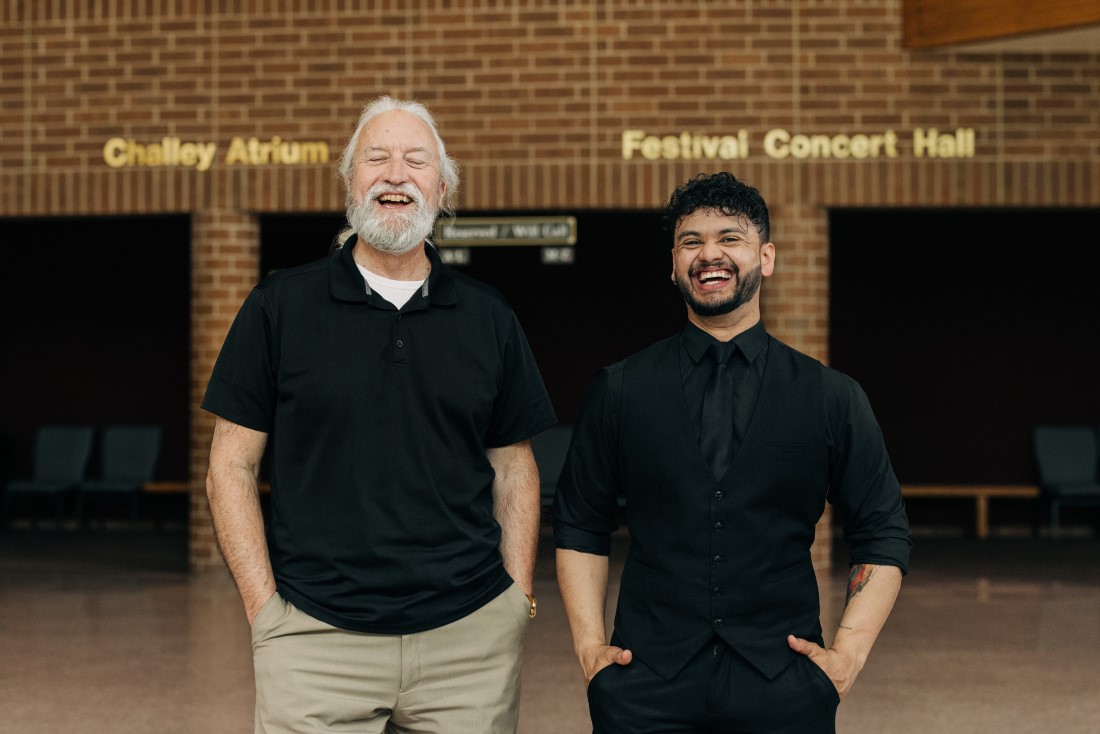
It’s important to Alejandro that when he teaches and performs, he is present in the joy of making music rather than worrying about playing or explaining things perfectly. He knows people will feel what he is feeling, and he wants them to see that he’s enjoying it, even if the journey to this joy was not easy.
Now in his senior year, he has made many friends in the music program — and he grins as he says he never imagined one of his best friends would be someone from Minnesota.
“I still feel like I’m a little bit different, of course, because that’s something I won’t be able to change,” Alejandro said. “I’m from a different culture, I was raised different, I grew up believing and doing different stuff, but it’s not a problem anymore, you know? It’s more like who I am.”

In jazz band rehearsal, Alejandro drives the beat on a Latin funk piece in 7/8 time. It’s an irregular meter, but the band is charging through it, their comradery evident. Alejandro and the pianist jokingly flex their arms, each laughing at the other. A few of the trumpeters take every opportunity to dance on the rest measures, though Matthew Patnode, professor of saxophone and jazz studies, says you can’t really dance to the “Juan Beatov Stomp” — something about that odd beat.
They’re speeding things up today. Matthew claps to keep his band on the up-tempo; the students tap well-worn white sneakers on tile. Their goal is to play the piece at 108 beats per minute, but on this day, they’re aiming to keep everyone together at 105. When Alejandro and the “bones,” as Matthew calls the trombones, fall out of sync, the band looks to Alejandro to keep feeding them the hits.
The jazz band is one of four NDSU ensembles where Alejandro currently performs. He’s also a member of the Wind Symphony, University Symphony Orchestra, and Percussion Ensemble, and during his freshman and sophomore years, he played on the snare line in the Gold Star Marching Band.
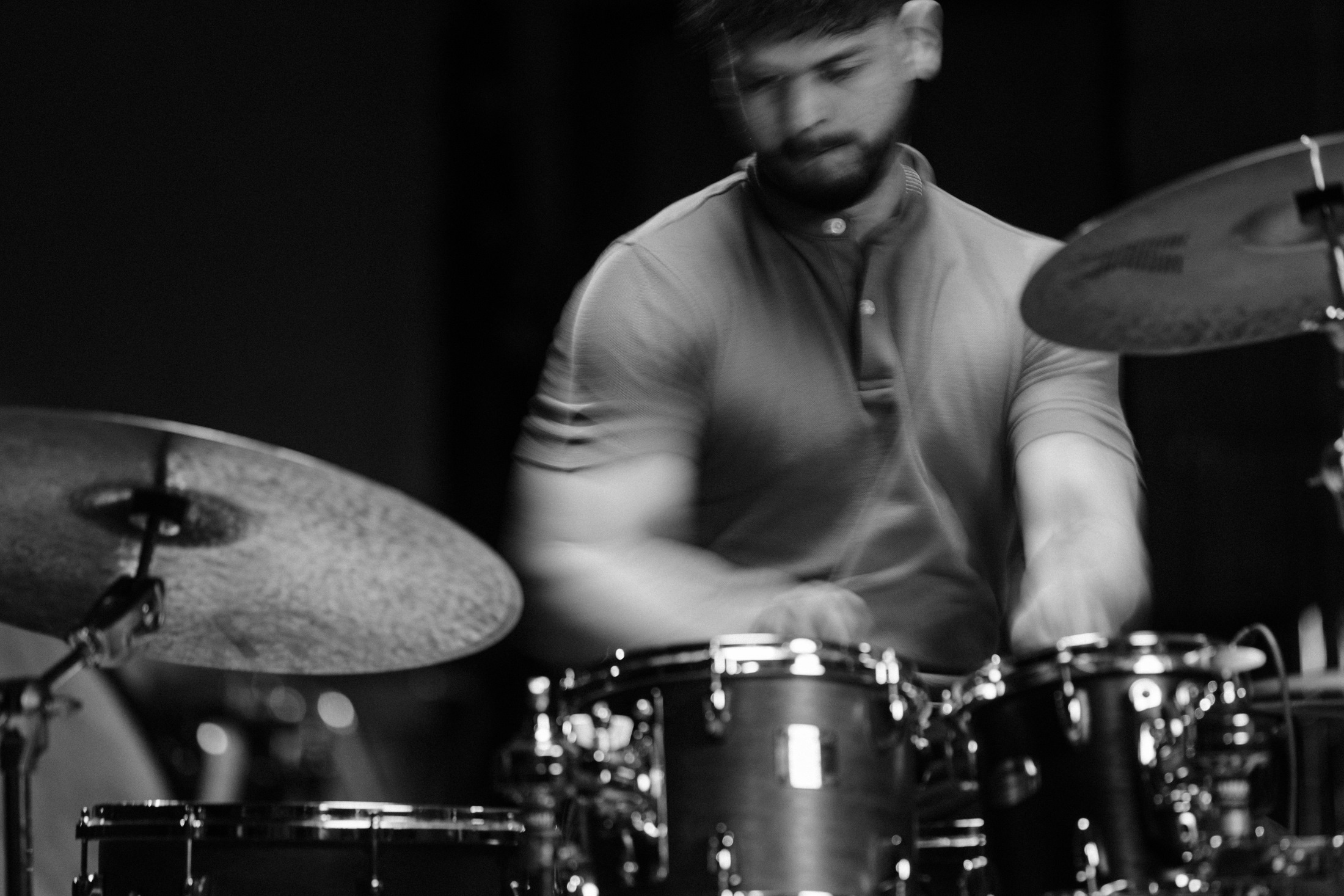
As a Euren Fellow, Alejandro balances feelings of immense gratitude with the responsibility not only to participate in multiple ensembles, but to perform to the highest level of his ability every day, because people are depending on him and looking to him as a leader.
“Since I got here, I always feel like … I don’t like saying this, because I don’t like to, you know, talk good about myself, but they made me feel like a superstar kind of thing,” Alejandro said. “It comes with a lot of responsibility for sure, but the faculty and my friends and just the people in general and the music environment has made me feel like I’m capable of doing that.”

The Challey Legacy
Alejandro is a recipient of the Euren Fellowship, a full-tuition scholarship established by Bob ’67, ’09 and Sheila ’23 Challey in honor of Bob’s uncle, William (Bill) Euren ’33. Bill served as the director of NDSU Bands from 1948 to 1968.
Bob and Sheila have also invested in the upcoming renovation of the Reineke Fine Arts Center; travel funds for the Gold Star Marching Band to perform at National Championship games; assistantships for graduate students in the music program, and more.
“The Challeys are incredible people,” Sigurd said. “They take such a direct and personal interest in our School of Music and Division of Performing Arts — and along with that, the whole of NDSU.”
Share This Story
Related Stories
The Man Who Built a Home for Heritage at NDSU
Michael Miller has dedicated his NDSU career to preserving the stories, heritage, and culture of the Germans from Russia.
Read More